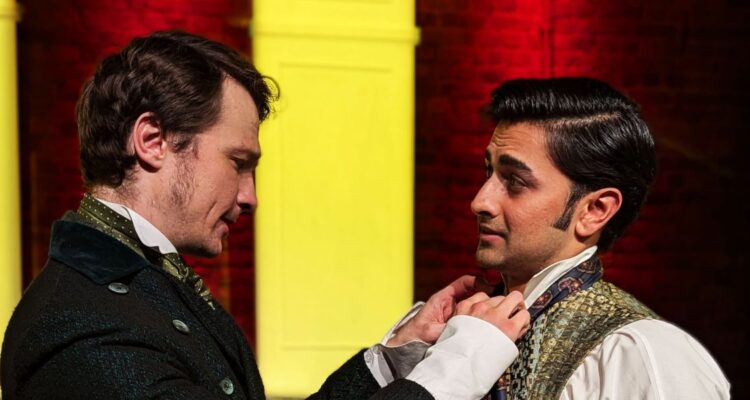This new play by David Kerby-Kendall finds an angle on Jane Austen that no one had previously suspected, and then develops it impressively both as a comedy of manners and as a piece of compassionate naturalism. These are difficult genres to juggle, and I am not sure the result works at all points. But the poise and quiet commitment of the writing, together with a good measure of witty zingers worthy of Austen herself amply justify a trip down to the Union Theatre, underneath the Southwark railway arches.
On the surface we are in the world of ‘Pride and Prejudice’ familiar to us from many a film and tv adaptation. The set is period Regency, but cleverly pared down by designer Bob Sterrett, into a minimalist grouping of fireplaces, chairs, tables and vases that the actors slide around between each of the short scenes to differentiate between each of the relevant fine residences, whether Pemberley, Longbourn or Netherfield. Costumes are again in period, with all the swish and swagger and bold colours this entails, though more often in favour of the men than the women – this was the era of Beau Brummell after all. However, there the resemblance largely ends. We begin with an elderly Mr Darcy confiding in his dyspeptic cat, and when the action begins in earnest it is a story that rhymes with Austen rather than repeating her.
Things at Longbourn appear to be heading in a familiar direction, as Mr and Mrs Bennet bicker and Elizabeth’s assertive feminism contrasts with sister Jane’s complacent docility. But the first time we meet Mr Bingley and Mr Darcy we realise we are in the presence of a prequel where intimacy has intervened ahead of the narrative, and where the prospect of heterosexual coupledom may offer more of a cover than a culmination. Bingley wants to escape from himself, and Mr Darcy, despite the familiar rebarbative manner, finds a new common cause with Lizzie’s independence of mind.
There is no point in spoiling the whirligig of the plotting, but suffice to say that marriages are planned and then disrupted before surprising accommodations are reached that identify a safe resting place for everyone’s inclinations in a pub called ‘Persuasion.’ There are two styles of writing in play here which I both admire and hesitate to endorse. In the set piece scenes there is some wonderful verbal jousting, especially between Darcy and Elizabeth, that quite lives up to the spirit and quality of the original. Moreover, the comic back-and-forth between Mr and Mrs Bennet is often so good that they threaten to dominate the play, just as these characters often want to take over most dramatic adaptations. However, this tone jars at times with the message-driven writing of the later sections which equally memorably deplores the consequences and costs of sexual concealment both for gay men and also for the women who become linked to them on false premises. Sometimes it feels like you are in two plays that never quite gel together and are competing with one another.
That said, there really is some excellent acting on offer here which delighted the press night audience. Sophie Bloor has all the feistiness and intellectual pep of Lizzie Bennet, while also making the most of a newly imagined scene in which she makes a speech at a political meeting. Her sister Jane is played by Sophie Bradley, who musters an excellent slow burn of betrayal as her conventional views of marriage turn into equally conventional outrage at the later revelations, before finding a softer final landing place. As the parents, Marianne March and Kerby-Kendall himself make fully use of the opportunities provided them, while also underlining some interesting elements of back-story in both their lives.
The key relationship, though, in this new version rests with the men, and here Noah Butt as Bingley and Michael Gillette as Darcy do a fine job of working through the uncertainties and anxieties of a gay relationship before there were gay identities. The rival pulls of social convention and sexual attraction, and conformity and self-sacrifice versus truth to self are prepared for and graphically and movingly depicted. Small gestures, such a tenderly corrected necktie, anticipate and suggest the specific passion to come. These actors are fully alive to the implications and care in the writing, and find convincing physical emodiments for it, especially in a memorable picnic scene.
It is far from perfect, and you sense that more keenly because formal perfection is so much a hallmark of the Austen world; but all-in-all this play is an entertaining and highly rewarding evening out that wears its heart all over its ample cravats and sashaying shawls.
Writer: David Kerby-Kendall
Director: Luke Fredericks
Cast: Sophie Bloor, Sophie Bradley, Noah Butt, Michael Gillette, David Kirby-Kendall, Marianne March
Until: 2 November 2024
105 mins with interval
Photo Credit: Johan Persson

